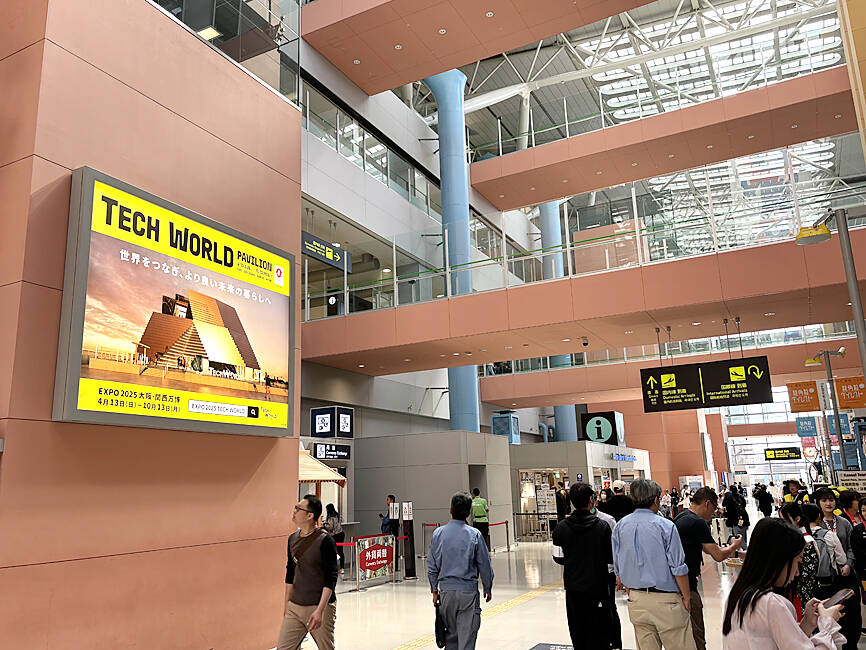Taiwan does not have an official pavilion at the World Expo in Osaka, Japan, because of its diplomatic predicament, but the government-backed Tech World pavilion is drawing interest with its unique recreations of works by Taiwanese artists.
The pavilion features an artificial intelligence (AI)-based art gallery showcasing works of famous Taiwanese artists from the Japanese colonial period using innovative technologies.
Among its main simulated displays are Eastern gouache paintings by Chen Chin (陳進), Lin Yu-shan (林玉山) and Kuo Hsueh-hu (郭雪湖), who were the three young Taiwanese painters selected for the East Asian Painting exhibition in 1927.

Photo: CNA
Gouache is a water-based opaque paint that offers brighter and heavier pigment coverage than watercolors, and the “Eastern gouache” technique has been defined as paintings that use colors mixed with gelatin, clay or metal.
One of the featured paintings, a 1968 work called Orchid (香蘭), was done by pioneering female artist Chen later in her life and portrays a woman in formal attire seated on a chair.
Another of the works, Lin’s 1930 classic masterpiece of Taiwanese Eastern gouache during the Japanese colonial period called Lotus Pond (蓮池), depicts a field of lotus flowers and an egret in the lower left.

Photo: CNA
Meanwhile, a display combining the 1930 work Festival on South Street (南街殷賑) by Kuo, which depicts a festive look at Taipei’s Dihua Street during the colonial period, with the modern Taipei 101 skyline, is the favorite of the head of the pavilion’s organizer.
James Huang (黃志芳), honorary chairman of Tamayama Digital Tech Co, said Kuo’s work, reinterpreted through technological innovation, is the one he most wanted to introduce to foreign visitors to the event.
The gallery also features recreations of works of other famous Taiwanese artists, including Huang Tu-shui (黃土水), Chen Cheng-po (陳澄波), Lee Shih-chiao (李石樵) and Li Mei-shu (李梅樹).
The government spent NT$2 billion (US$61.55 million) to build the Tech World pavilion, which is taking part in the World Expo as a private-sector pavilion.
Beyond the AI-based art gallery, it showcases a slew of smart technologies and products developed by Taiwanese companies such as Asustek Computer Inc, AUO Corp and Hiwin Technologies Corp, said the Taiwan External Trade Development Council, which James Huang also heads.
The pavilion has three multimedia theaters offering visitors an interactive and immersive experience through display technologies.
Takashi Kubota, a Japanese visitor to the Tech World pavilion, said he visited Taiwan 30 years ago when he took the Alishan Forest Railway train in Chiayi County, but Tech World had shown him scenic spots in Taiwan he had not seen.
He said the Taiwanese temple architecture images showcased in the AI Art Gallery were the most impressive displays he saw.
The World Expo opened on April 13 and runs until Oct. 13.

The manufacture of the remaining 28 M1A2T Abrams tanks Taiwan purchased from the US has recently been completed, and they are expected to be delivered within the next one to two months, a source said yesterday. The Ministry of National Defense is arranging cargo ships to transport the tanks to Taiwan as soon as possible, said the source, who is familiar with the matter. The estimated arrival time ranges from late this month to early next month, the source said. The 28 Abrams tanks make up the third and final batch of a total of 108 tanks, valued at about NT$40.5 billion

Two Taiwanese prosecutors were questioned by Chinese security personnel at their hotel during a trip to China’s Henan Province this month, the Mainland Affairs Council (MAC) said yesterday. The officers had personal information on the prosecutors, including “when they were assigned to their posts, their work locations and job titles,” MAC Deputy Minister and spokesman Liang Wen-chieh (梁文傑) said. On top of asking about their agencies and positions, the officers also questioned the prosecutors about the Cross-Strait Joint Crime-Fighting and Judicial Mutual Assistance Agreement, a pact that serves as the framework for Taiwan-China cooperation on combating crime and providing judicial assistance, Liang

A group from the Taiwanese Designers in Australia association yesterday represented Taiwan at the Midsumma Pride March in Melbourne. The march, held in the St. Kilda suburb, is the city’s largest LGBTQIA+ parade and the flagship event of the annual Midsumma Festival. It attracted more than 45,000 spectators who supported the 400 groups and 10,000 marchers that participated this year, the association said. Taiwanese Designers said they organized a team to march for Taiwan this year, joining politicians, government agencies, professionals and community organizations in showing support for LGBTQIA+ people and diverse communities. As the first country in Asia to legalize same-sex

MOTIVES QUESTIONED The PLA considers Xi’s policies toward Taiwan to be driven by personal considerations rather than military assessment, the Epoch Times reports Chinese President Xi Jinping’s (習近平) latest purge of the Chinese People’s Liberation Army (PLA) leadership might have been prompted by the military’s opposition to plans of invading Taiwan, the Epoch Times said. The Chinese military opposes waging war against Taiwan by a large consensus, putting it at odds with Xi’s vision, the Falun Gong-affiliated daily said in a report on Thursday, citing anonymous sources with insight into the PLA’s inner workings. The opposition is not the opinion of a few generals, but a widely shared view among the PLA cadre, the Epoch Times cited them as saying. “Chinese forces know full well that